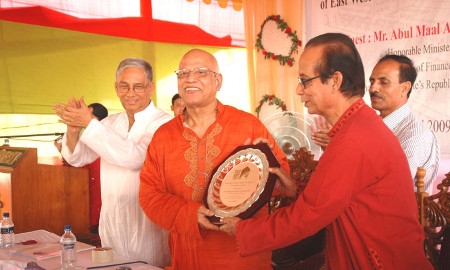Bangladesh has been a pioneer in expanding access to digital technology to the greater population. Despite generally being ranked among the less developed countries, mobile penetration has been among the highest of developing economies, with a teledensity of more than 40%. Government initiatives, such as its Digital Bangladesh program, have succeeded in attracting rising numbers of ICT and service sector-based firms to the garment and textile powerhouse.
In its analysis of the country as an emerging destination for IT outsourcing, Bangladesh Beckons, global auditor KPMG points out that not only has Bangladesh made it onto Goldman Sachs’ N-11 list of nations that could greatly impact the global economy after the BRICs, but also S&P, Moody’s and JP Morgan all draw investors’ attentions to Bangladesh’s business climate being on an upswing.
Growth
According to the Ministry of Finance, global GDP expansion since 2009 has been led by China at 40%, followed by India (31%), Nigeria (30%), and Turkey (28.3%), with Bangladesh earning fifth place with 25.5% growth. “I personally believe that if we had had a better supply of energy resources in 2009 we would have moved to a higher level of economic existence at the moment,” says Finance Minister Abul Maal Abdul Muhith, a renowned economist, diplomat, freedom fighter, and language veteran. “We did very well, we are number five in the world in average growth over the past four years. We have been very steady.”
Transparency
The rapid spread of mobile technology and the digitalisation of official procedures have helped to increase transparency and security in the financial sector. Regarding the personal banking sector, Mr Muhith says, “Mobile banking has made transfers very simple and risk free. Also, I know that because only I have the mobile telephone, then only I can take the transferred money. So it is also ensuring the identity of the person. It is in every way efficient and corruption free.”
The government has introduced online tendering in some of its main agencies, such as those responsible for awarding contracts for road building, waterworks, flood protection, and power generation. Major tendering processes have been put online and the rest are under way. The aim is that, except for small local works contracts, almost everything will be online in four to five years’ time.
Micro-credits
For more than a century, since the Cooperative Act was passed in 1904, micro-credits have been helping budding Bangladeshi entrepreneurs get started. “Some 27% of the total credit that is available to the country today is micro-credit,” says the Finance Minister. “It was around 6-7% when we came into office because we are allowing other micro-credit institutions to function. I must say, PKSF (Palli Karma-Sahayak Foundation) which was set up in 1991, has expanded micro-credit operations.”
Social progress
The domestic market in Bangladesh is growing. In 1983 it was a country of almost 90 million people, with a market of 10 million. Today, it is a country of 150 million inhabitants and the market is 50 million. “That is the change that we have made in handling poverty and inequality,” says Mr Muhith, “largely because of government programs, social security, pensions, food security initiatives, and so on. I would advise foreign investors to get involved in our agricultural industry and food processing industry. You can export but even for the domestic market you can come to invest here.”
At home, a decentralised approach to governance means local government applies directives set by central government but has the ability to adapt it to suit local conditions. Abroad, Bangladesh, which is often referred to as a ‘good neighbour’ and a ‘stabilising force in South Asia’, also steps up to the mark when global events call for unified efforts. “Look at the area of disaster relief. We are one of the best countries in the world in disaster relief,” adds Mr Muhith.

0 COMMENTS